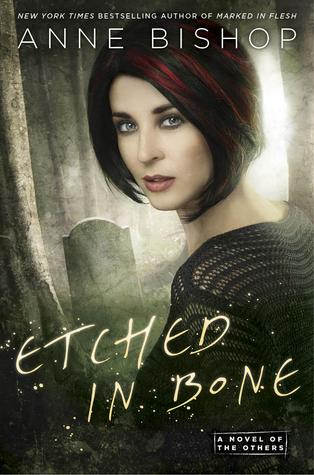 Etched in Bone (The Others, #5)
Etched in Bone (The Others, #5) by
Anne Bishop Formats available: hardcover, ebook
Series: The Others #5 Pages: 416
Published by Roc on March 7th 2017
Purchasing Info: Author's Website,
Publisher's Website,
Amazon,
Barnes & Noble,
Kobo,
Bookshop.org Goodreads New York Times bestselling author Anne Bishop returns to her world of the Others, as humans struggle to survive in the shadow of shapeshifters and vampires far more powerful than themselves…
After a human uprising was brutally put down by the Elders—a primitive and lethal form of the Others—the few cities left under human control are far-flung. And the people within them now know to fear the no-man’s-land beyond their borders—and the darkness…
As some communities struggle to rebuild, Lakeside Courtyard has emerged relatively unscathed, though Simon Wolfgard, its wolf shifter leader, and blood prophet Meg Corbyn must work with the human pack to maintain the fragile peace. But all their efforts are threatened when Lieutenant Montgomery’s shady brother arrives, looking for a free ride and easy pickings.
With the humans on guard against one of their own, tensions rise, drawing the attention of the Elders, who are curious about the effect such an insignificant predator can have on a pack. But Meg knows the dangers, for she has seen in the cards how it will all end—with her standing beside a grave
Our Review:
Marlene: As I write this, it’s early October. I got the eARC from Netgalley five months pre-publication, and simply couldn’t wait until I read it. Whatever else is in this series, it’s definitely reading crack. I can’t resist them, and once I start, I can’t put them down until I’ve finished. Something about this world and these people drags me in every single time.
Cass: I’m stunned an ARC was available so early. Is that normal? Either way, I agree there must be some kind of digitally transferable narcotic in the font, because I cannot stop reading these books….and yet I can never come up with a reason to like them. Other than Hope Wolfsong. LONG LIVE HOPE WOLFSONG!
Marlene: FYI five months is a bit early. Three is more common, and sometimes it’s less than one. Occasionally the eARC comes out just slightly post-publication, which just seems back-asswards. I digress.
This series always strikes me as dark and fluffy, which really ought to be an oxymoron, and somehow isn’t. The Black Jewels series was dark and erotic (although Cass disagrees strenuously about the erotic quotient). Certainly the sexuality in that series was often front and center, even if wrapped in a choke collar. The “Eros” quotient of The Others is almost non-existent. And it’s also where some of the fluff comes in. Eventually, if this series continues, there will be a romantic relationship between Simon Wolfgard and Meg Corbyn. But right now that part is all confused emotion and virtually no action at all. And that’s actually a good thing, because even 5 books in, Meg is nowhere near ready for the level of intimacy and confusion that comes with being in a romantic relationship. That she’s getting there at all is part of what makes this series her journey.
Cass: The sex stuff confused the shit out of me this time around. My understanding from previous books was that the Others will totally plow humans while in their human forms – mostly as an experiment or kink. However, this time around, Simon tells Meg that the Wolves only mate “once a year.” No recreational sex? If they only want to have sex one time a year, would they really waste it on a human – someone they would be totally open to consuming for a post-coital snack?
I really struggled with continuity in this book. Not just with sex but with masturbation – I mean cutting. Wasn’t Meg addicted to cutting last time? Weren’t there pages and pages of debate about how she just can’t stop touching herself and how all those self-inflicted orgasms were going to kill her? And yet….suddenly no cutting. Instead of playing with herself she has a deck of cards. Wow that was easy. So easy that you wonder why the hell ALL the rescued prophets haven’t been given a sketch book and a deck of cards.
Marlene: I read the sex issues about mating vs. recreational sex as coming from the animal side of their natures. Also as part of the physiological differences between males and females on the animal side. Comparing to cats, with which I’m all too familiar, an intact female will go into heat every six months or less. The rest of the time she has no interest in mating. However, whenever a local female does go into heat, all the intact male cats for miles around are ready and eager to sire her kittens. Human females may not be fertile all the time (thank goodness) but are receptive a lot more often than once a year.
What I found interesting about this aspect was the way that the Others referred to Meg as Simon’s future mate – implying that they would, or at least could, form that long-term bond. Nothing like that has ever happened before. The Others may have recreational sex with humans, but they don’t form mating bonds with them. Except Simon and Meg, if they both survive the trouble they constantly find themselves in.
As far as cutting vs. the deck of cards, I did see Meg struggle with her desire to cut. To me, she seemed like an addict in a 12 step program, trying to resist the urge to cut “today”, and attempting to put together a string of “todays”. I also didn’t see that it was/would be the orgasms resulting from the cut that would eventually kill her. The orgasms are the built-in reward, the high, for the cutting. What would kill her would either be going mad, as the results of the uncontrolled cuts that sounded like a Dali painting mixed with some of Picasso’s cubism on steroids, or simply bleeding out, if she cut herself and no one was around for after care. Or if she just plain screwed up and hit an artery.
In other words, to me it made sense within this world’s context.
Cass : One thing I have enjoyed so far in the series has been the world-building……but that all went to shit with this installment. We spent so much time really looking into how the infrastructure of a society changes when the land cities are built on is leased, when every road and train track is an easement, when you have absolutely no water rights and pollution is prohibited. Etched in Bone stepped back from the larger society-based stories to really focus on Lakeside and the human pack, and introduction of “bad humans.”
The Others had their own reasons for reacting the way they did to the “bad humans,” which was addressed. Everyone else? Suddenly developed a case of shit-for-brains. Oh, you have proof that children are not being fed because an abuser is stealing their food? That they are living in absolute filth? That a child is being groomed for sex work? Do humans not have child protective services here?! The main characters all discuss how the bad human (trying to avoid spoilers) is going to fuck everything up, and possibly get them all killed…..but does anyone take any action? You don’t need Simon to handle an abusive drug-dealing thief. Instead, everyone sits back and frets about how bad it could be, and what a huge danger this person will be if they learn about Meg, and how scared we are for the poor defenseless kids…..but nothing happens. At all. Until it all gets so bad that The Others are forced to intervene. If this is how the so-called “good humans” behave, maybe it’s a good thing The Others so tightly control everything in Thaisia. I wouldn’t trust these morons with any kind of governing responsibility.
Did we know that humans are all super-sexist before this book? That there is rampant totally legal gender discrimination in employment? The only solution to which is, you guessed it, Others making the hiring decisions.
Marlene: The way that the bad shit went down drove me batty too. Howsomever, I think I let the way things unfolded go because it felt like it matched the current popular perception of how child protective services does and doesn’t work. (As a popular perception, it may not match reality). But it seemed like we as the audience knew for certain exactly how bad things were, because the story is told in third-person omniscient perspective. The characters in the story, while they had very, very solid guesses that were right, didn’t “know” in a legal sense, except for Sierra who was just as abused as the children. To bring child services in, someone would have to be willing to stand up and say what they witnessed and experienced. And the ones who actually knew, the children and Sierra, were up the river Denial for most of the story.
(I’m seeing a comment that popular perception is wrong, which doesn’t surprise me. But also doesn’t change what popular perception is. There are too many stories in the media where the local equivalent of CPS is overworked and understaffed and misses obvious signs or doesn’t investigate at all.)
Also, based on the rampant sexism we see from the human side of this story, we don’t actually know whether the kind of child services that we think of today even exists. That women were still restricted from some jobs even at what seems like an analog to our present is something that I don’t remember having seen before in the story, but also didn’t completely surprise me. The way that civilization keeps getting knocked back by The Others would mean that some reforms might not get reached. The ability of women to serve in all jobs everywhere is a hard-won right that has only occurred within my lifetime, and only in certain places on this planet. And is frequently a right that exists on paper but is next to impossible to enforce in practice.
Cass: That is not how CPS works! GAH! Lawyer brain is exploding. You don’t have to know for sure what is going on in the home. If you see signs that something may be going on, you report it. Specially trained investigators separate the children from their abuser and ask all kinds of general questions. They send the kids to counselors. They do medical tests. They survey the home. They can drop in unexpectedly. They pull school records. They interview neighbors and family…..you don’t need to see a kid being starved and beaten to report that you suspect a child is being starved and beaten. It’s not perfect, and they don’t catch everything, but they would have here. Pretty clear the kids were very chatty and open to admitting anything – when asked.
If CPS in Thaisia does not exist or is not like this….pretty easy to address. People commenting about the abuse could throw off a line: “And with food shortages, child protective services is refusing to take in anyone who is not an orphan…” something that addresses existing world building and tells you that some of the human services agencies we take for granted don’t exist in this form. Instead there is the implication that there is a CPS, but the bloody COPS AND ATTORNEYS of all people can’t be bothered to involve them. [end rant]
Marlene: It does seem to be a piece of worldbuilding that is missing. I think there was also an element of the human authorities deferring to The Courtyard on what was their turf, even when The Elders were wrong, wrong, wrong. Pissing off The Elders results in annihilation, and sometimes the needs of the many end up outweighing the needs of the few, whether anyone involved likes it or not.
And your rants never end, but they are generally fascinating.
Cass: I’m only ending that particular rant. I have a whole separate rant. WHERE IS MY HOPE WOLFSONG?! I could have skipped all the Meg/Simon stuff in favor of more Hope. Hope! Hope! Hope! Who cares what Meg or Simon are wearing at any particular time? You know what I care about? HOPE WOLFSONG TEACHING A WOLF TO DRAW. That is wonderful story I want to hear about. The new renaissance in Earth Native Art. While the Elders are deciding what to keep, they could develop an appreciation for artistry. They already like books and music….
Marlene: And COOKIES! (Cass insert: Yesssss, save the bakers)
But seriously, after several stories where we’ve seen more and more of the world of Thaisia, both its successes and very definitely its failures, the story in Etched in Bone is so insular it almost seems claustrophobic. And also a bit anti-climactic.
So many of the earlier books started with Meg and Lakeside and expanded outwards into the world, seeing the ways that the ripple effects of Meg’s adoption into the Lakeside Courtyard kept having effects in the wider universe. It felt like nearly every interaction, not just between Others and humans, but also between different species of Others, caught some of the ripples of Meg’s integration into Lakeside.
This story takes place on a very small scale, with the introduction of one sociopath into the Lakeside Courtyard, and then the way that the poison spreads throughout the community, and everyone’s reaction to it. It reminded me a bit of more than one TV episode where the hero or heroine has to find a righteous way to eliminate an abuser. This story felt small.
Cass: Yeah, I really could have seen it as short story or novella told from Twyla/Monty/ Sissy’s perspectives. (I loved Twyla’s irritation that all her kids refuse to use the names she gave them in favor of nicknames). The main series follows the main plot, and we can see how these things are impacting individual lives in other outings. This book felt so ancillary that – if there is another book coming – I would say you could skip this one and miss absolutely nothing.
Marlene: As far as the main plot goes, yes, this book feels skippable. Except for one thing that I wonder whether it will have later consequences. The Elders – the really, really, really powerful Others, the ones that even the “lesser” Others are pee in their pants (when they wear pants) scared of, totally, utterly and completely fucked up. And they fucked up in a way that none of The Others will forget. They also fucked up so badly that the ones they consider lesser banded together to tell them to fix the mess they made and made that stick. That’s a potential shift in the balance of power, as Father Erebus if no one else will certainly realize that The Elders are no longer all powerful if enough of them can get together and stick together.
And while the story as a whole felt anti-climactic, I still enjoyed being immersed in this world for a few hours. I like most of these people, even the ones for whom the definition of people is a bit loose. I like watching them interact, and it is always fun to see the way that these very different groups are building a community that respects their differences and searches for the best way they can all work together.
And unlike my friend Cass, I am interested in watching the progress of Meg and Simon’s relationship.
Cass: I’m already prepared for this series to end when Meg gives birth to the first blood prophet wolf.
My review can be summarized in one line: Not enough Hope Wolfsong. -500 points.
Escape rating F for completely fails to believably address abusive families.
Marlene: I’m also prepared to see this series end, either with the birth of Meg and Simon’s first child, or more likely with their wedding/mating ceremony. I had a terrible thought about just the normal amount of bleeding that occurs in childbirth and wondered if the author would or even should go there. It might be fascinating if Meg sees visions of the child’s future as she is giving birth to it, or the scene could be more gruesome and gory than many readers will want to see in what should be a happy ending. But we’re not nearly there yet. So I really hope that this series isn’t done.
On my other hand, I enjoyed this while I read it, but found it infinitely forgettable after I finished. And it’s only been a couple of days. So I have very mixed feelings.
Escape Rating B for being absorbed in it while I was in it, but being forgettable immediately after.

















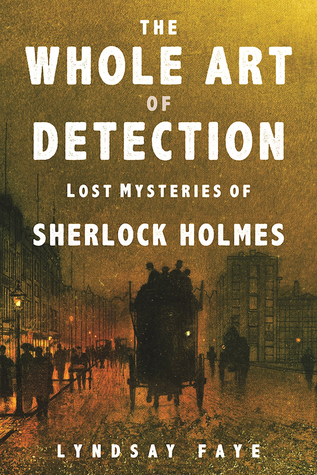 The Whole Art of Detection: Lost Mysteries of Sherlock Holmes by
The Whole Art of Detection: Lost Mysteries of Sherlock Holmes by 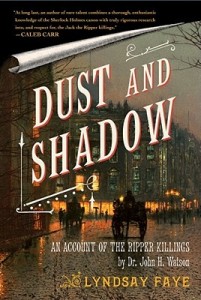 One of the best of the latter type that I have read was Lyndsay Faye’s
One of the best of the latter type that I have read was Lyndsay Faye’s  Madly (New York, #2) by
Madly (New York, #2) by  Madly is the follow up to two of Ruthie Knox’s best contemporary romances, not that all of her books aren’t utterly marvelous.
Madly is the follow up to two of Ruthie Knox’s best contemporary romances, not that all of her books aren’t utterly marvelous.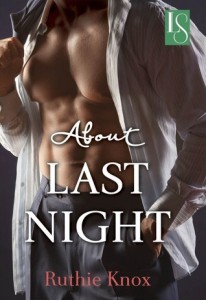 The lesson that the pain is the same whether you talk about it or not is one that we all need to learn.
The lesson that the pain is the same whether you talk about it or not is one that we all need to learn.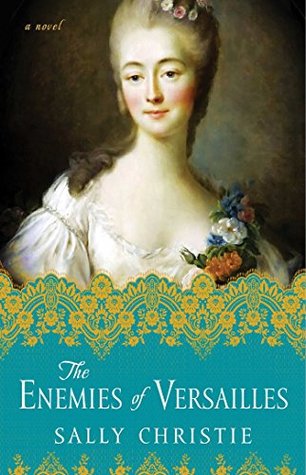 The Enemies of Versailles (The Mistresses of Versailles Trilogy #3) by
The Enemies of Versailles (The Mistresses of Versailles Trilogy #3) by 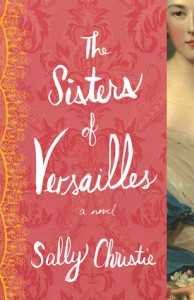 The Enemies of Versailles, and the entire series of the
The Enemies of Versailles, and the entire series of the 
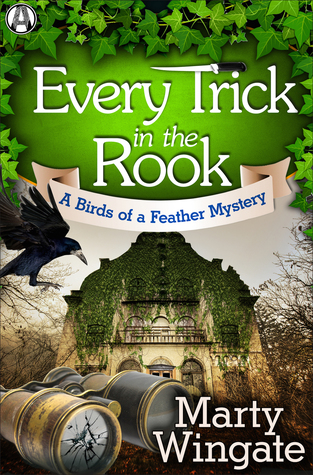 Every Trick in the Rook (Birds of a Feather #3) by
Every Trick in the Rook (Birds of a Feather #3) by 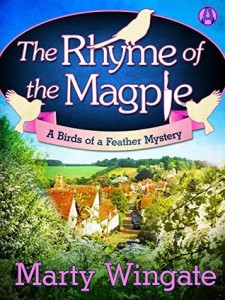 But what made this outing in the series less entertaining than particularly the first book,
But what made this outing in the series less entertaining than particularly the first book,  Etched in Bone (The Others, #5) by
Etched in Bone (The Others, #5) by 
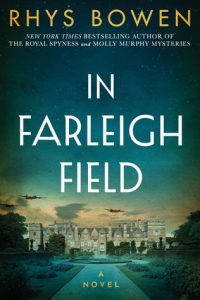 Blog Recap:
Blog Recap: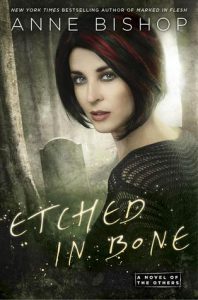 Coming Next Week:
Coming Next Week:










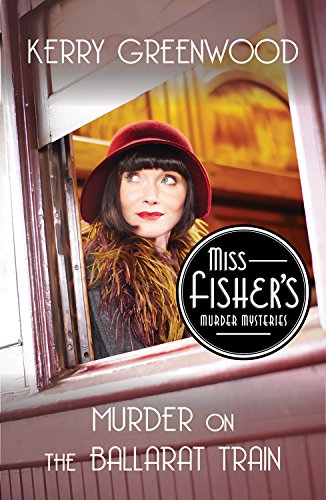 Murder on the Ballarat Train (Miss Fisher's Murder Mystery #3) by
Murder on the Ballarat Train (Miss Fisher's Murder Mystery #3) by 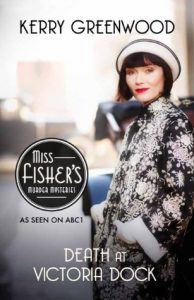 I enjoyed this method of “reading” Phryne’s story just as much as I did reading it. I will, however, make one final note about the audio performance. In any audiobook where a single narrator attempts to voice multiple characters, some characters work better than others. That problem is made more difficult in the case of Phryne, as those of us who have watched the TV show already have a fixed idea of what these characters are supposed to sound like. The narrator of Murder at the Ballarat Train did an excellent job portraying Phryne, and surprisingly a fairly good job of making the male voices sound at least OK. But for some reason my ear kept telling me that Dot’s voice was completely off.
I enjoyed this method of “reading” Phryne’s story just as much as I did reading it. I will, however, make one final note about the audio performance. In any audiobook where a single narrator attempts to voice multiple characters, some characters work better than others. That problem is made more difficult in the case of Phryne, as those of us who have watched the TV show already have a fixed idea of what these characters are supposed to sound like. The narrator of Murder at the Ballarat Train did an excellent job portraying Phryne, and surprisingly a fairly good job of making the male voices sound at least OK. But for some reason my ear kept telling me that Dot’s voice was completely off.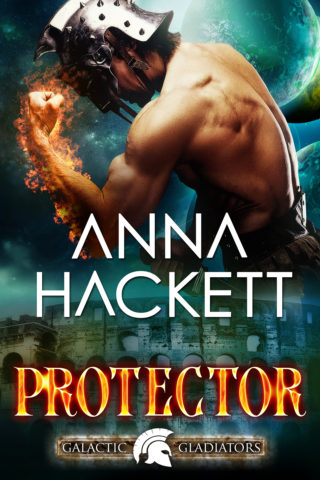 Protector (Galactic Gladiators #4) Formats available: ebook
Protector (Galactic Gladiators #4) Formats available: ebook  Protector is the fourth book in the author’s sun, sandals and stars series,
Protector is the fourth book in the author’s sun, sandals and stars series,  Escape Rating B: I enjoyed this story a lot, but there wasn’t anything that made it rise to the level of
Escape Rating B: I enjoyed this story a lot, but there wasn’t anything that made it rise to the level of